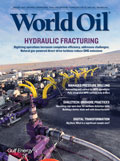Issue: January 2022
Features
For more than a year, the African Energy Chamber has been pushing back against steadily building pressure to halt new foreign investments in Africa’s oil and gas industry.
The new year is shaping up to be an important time for the energy security of our state and nation, and while there are many important issues to face, here are my top five energy resolutions for 2022.
Modern, open-architecture programming is unlocking the value of upstream data to deliver more efficient, and safer, workflows that meet the objective of improving return on investment.
Sooner or later in this type of job (editor), even the few governmental officials that you thought were good will eventually disappoint you.
Automation of drilling operations minimizes safety risks while increasing efficiency. Targeting well control operations provides meaningful advances to operational performance and risk reduction.
Computational methods were used to assess the capacity of four surfactant molecules. The experimental assessment, based on rocking cell measurements, determined the minimum effective dose necessary to inhibit agglomeration, enabling an efficient funnel for molecular optimization and customization.
Upcoming EPA methane regulations are far-reaching and will have a major impact on upstream and midstream operations. Analysis reveals that new technologies may help to reduce operators’ regulatory burden while detecting more emissions than periodic hand-held optical gas inspections.
Utilizing environmentally friendly bio-based surfactants that provide mechanisms of action, which surpass traditional petroleum-based products, U.S. operators are improving crude output while increasing total well lifecycle.
A comprehensive suite of products advances drilling with excellent, integrated capabilities
At the risk of writing the shortest ever technical article, the answer is 30 or more.
Special Focus
Increased industry demand for lower emissions, improved operational efficiency and reliability, and competitive capital cost structure, all call for innovative thinking in hydraulic equipment design and engineering. Direct-drive turbine technology has been proven to take up the challenges.
As fracturing intensities continue to push component capabilities, a system-level approach is required to further enhance operational efficiencies. An innovative completion technology ecosystem has delivered OPEX savings and QHSE improvement through system integration, automation and digital control capabilities.
Columns
Newfoundland and Labrador inexplicably ceases seismic funding
Exploration: Not dead
Ditching diesel for clean options
Whole lotta shaking going on
Shaky ground: Railroad Commission takes much-needed stand on oil field earthquakes
Underinvestment—a good strategy?
Resources



